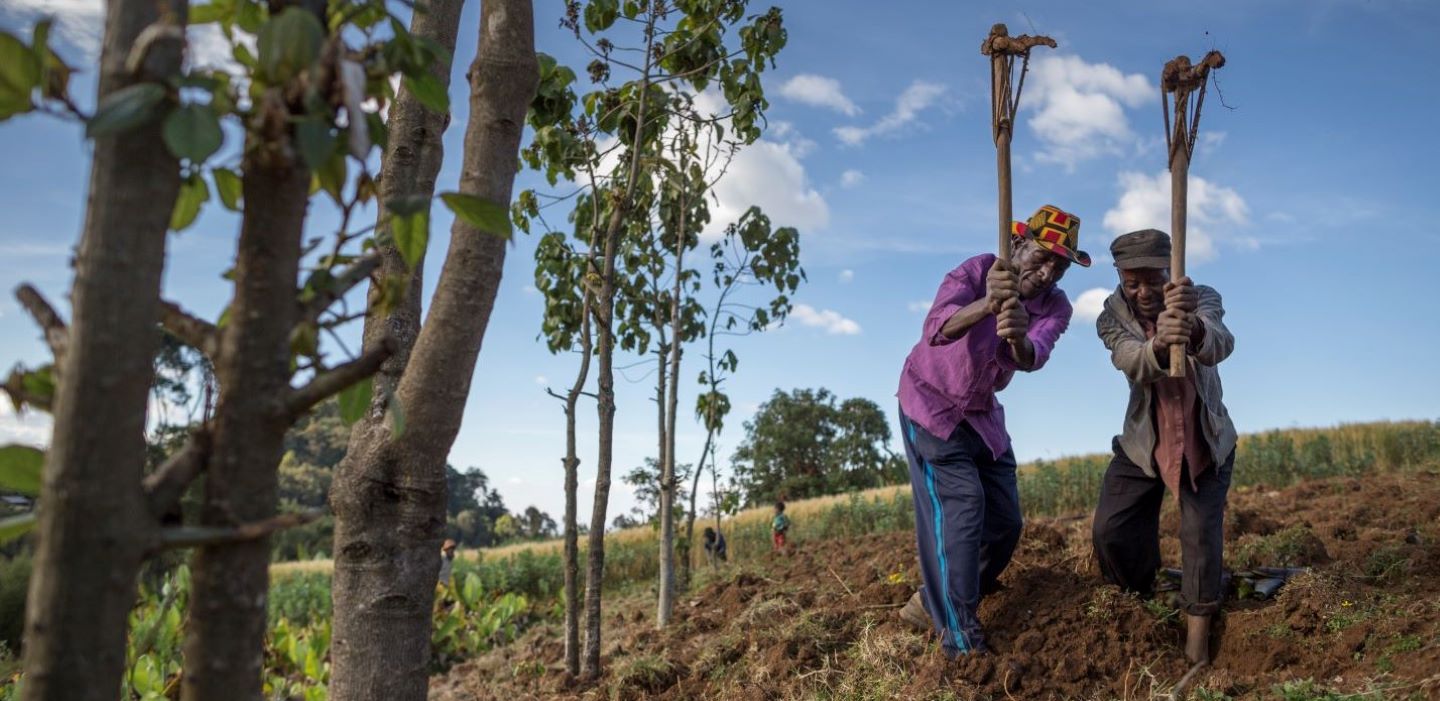Germany commits EUR 15 million to pay poor rural people for their work to preserve ecosystems
IFAD Asset Request Portlet
Asset Publisher
Germany commits EUR 15 million to pay poor rural people for their work to preserve ecosystems
15 November 2022
Sharm El-Sheik (Egypt), 15 November 2022 - To support the essential contribution that rural people make to preserve ecosystems, the UN’s International Fund for Agricultural Development (IFAD) will remunerate rural communities and small-scale producers for their environmental work through a Payment for Ecosystem Services (PES) projects. Today at COP27 Germany pledged to contribute to the project by providing an additional EUR 15 million to IFAD's Enhanced Adaptation for Smallholder Agriculture Programme (ASAP+).
As the increasing speed and intensity of the climate crisis are outpacing the ability of poor rural people to cope, “we need to think out of the box and find new ways, such as this scheme, to bring justice and provide the support that rural people need,” said Jo Puri, IFAD’s Associate Vice-President, Strategy and Knowledge Department.
Three PES pilot projects will be developed in Brazil, Ethiopia and Lesotho to help small-scale producers build their resilience to climate change, boost food production, better participate in markets, and improve their access to nutritious diets. Each of the three pilots will be equally funded. All the activities under the PES project aim to contribute to the reduction of greenhouse gas emissions and boost carbon sequestration.
“We must not spare efforts in acknowledging and harnessing the strategic contribution of rural people in low- and middle-income countries to improve food security and preserve vital environmental resources for future generations,” said Jochen Flasbarth, State Secretary in Germany’s Federal Ministry for Economic Cooperation and Development (BMZ), at the signing ceremony. Germany's financing pledge is also a way to encourage the international community to diversify financial instruments to fund sustainable climate adaptation and climate mitigation practises in the agricultural sector.
In Brazil, marginalized local communities will be paid to preserve forests by developing and marketing a wide array of non-timber forest products. Rural communities will protect forests by gathering, processing and selling forest products, activities that do not require cutting down or damaging trees. Remunerated activities align with traditional practices and are an income alternative for poor and food-insecure communities.
“It is about time to reward the economic value of these essential services that rural people are carrying out. These are key activities to preserve biodiversity and ecosystems, which also provide a significant contribution to mitigate climate change. They are indeed preserving our future,” Puri added.
The PES scheme in Lesotho will incentivize better water resource management in the Orange River Basin, spanning across Lesotho, South Africa, Botswana and Namibia, and rural communities will be able to contribute to restoring degraded soils and landscapes.
In Lesotho and Ethiopia, as an income-generating opportunity, small-scale farmers will be connected to the voluntary credit carbon market, where companies and countries can buy credits to make up for greenhouse gases, they themselves emit.
Since the establishment of IFAD in 1977, Germany has contributed US$711 million to IFAD’s work on climate action, gender equality, food and nutrition security, and establishing equitable and sustainable food systems. Germany has also provided loans for up to EUR 800 million through KfW, Germany’s public development Bank, and contributed US$89 million in supplementary funds to support inclusive sustainable value chains development, climate adaptation, and youth employment.
Note to editors:
Germany’s pledge to ASAP+ comes under their G7 Presidency this year, and falls under the workstream CompensACTION “for food security and a healthy planet.”
The CompensACTION initiative aims to support large-scale compensation mechanisms for carbon and other ecosystem services by facilitating discussions between stakeholders from the policy, science and private sector. It is also advancing recommendations for global compensation mechanisms driving food systems transformation, and fostering partnerships to implement this type of projects.
The Adaptation for Smallholder Agriculture Programme (ASAP) was launched by IFAD in 2012. A multi-year and multi-donor financing window, ASAP provided a new source of cofinancing to scale up and integrate climate change adaptation across IFAD’s portfolio. ASAP reached over 6.5 million small-scale farmers across 41 countries - helping them to better adapt to a changing climate. IFAD's ASAP+ launched in 2020, is the next phase of the programme, a financing mechanism envisioned to be the largest fund dedicated to channelling climate finance to small-scale producers. It is focusing on the climate change drivers of food insecurity. It has a target of mobilising US$500 million, which is expected to benefit more than 10 million people.
Press Release No.: IFAD/61/2022
IFAD invests in rural people, empowering them to reduce poverty, increase food security, improve nutrition and strengthen resilience. Since 1978, we have provided US$23.2 billion in grants and low-interest loans to projects that have reached an estimated 518 million people. IFAD is an international financial institution and a United Nations specialized agency based in Rome – the United Nations food and agriculture hub.
A wide range of photographs and broadcast-quality video content of IFAD’s work in rural communities are available for download from our Image Bank.
